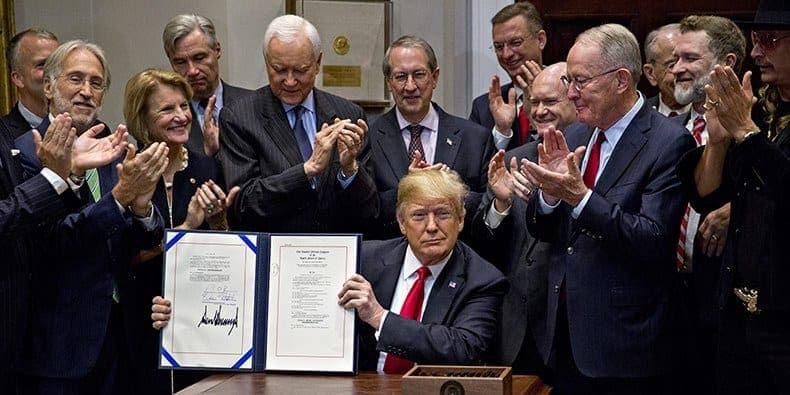[vc_row][vc_column][vc_column_text]Donald Trump signs the Music Modernization Act (Andrew Harrer/Bloomberg via Getty Images)[/vc_column_text][vc_custom_heading text=”Trump Signs Music Modernization Act Into Law” font_container=”tag:h2|text_align:center” google_fonts=”font_family:Montserrat%3Aregular%2C700|font_style:400%20regular%3A400%3Anormal”][vc_column_text]
The Music Modernization Act, which received complete bipartisan support, most notably guarantees that songwriters and artists receive royalties for songs recorded prior to 1972. It also creates a new organization — run by publishers and songwriters — that’s tasked with identifying copyright owners and paying them their royalties if songs are played on streaming platforms like Spotify, Pandora, Apple Music etc. Overall, it establishes a new standard for setting digital royalty rates for songwriters and publishers.
“It’s been the wild west out there,” said Tommy James, a musician and songwriter with music on Spotify. “Everybody kind of carved out their own territory, and so now, everybody’s going to be paying the same rate.”
James, who famously headed the1960s rock band Tommy James and the Shondells, called the MMA (formally the “Orrin G. Hatch-Bob Goodlatte Music Modernization Act) a “positive” step forward for songwriters, artists and publishers.
For years, digital radio stations — including satellite radio, like SiriusXM — have not been paying for pre-1972 master recordings. One of Sirius’ most popular stations is 60s on 6, which plays music entirely from the 1960s.
“And of course,” James, who hosts his own weekly radio show on the 60s on 6 channel, said, “that’s where the money music really is.”
SiriusXM reportedly tried to derail the bill’s progress by hiring a group of lobbyists to stop it, according to a tweet from an advocacy organization for The Recording Academy, which produces the Grammy Awards.
Other leaders in the music industry reacted to the news with enthusiasm and support. In a statement to Rolling Stone, which compiled a list of reactions, National Music Publishers Association President and CEO David Israelite said he was “incredibly grateful” to Congress and Trump for signing it.
“Songwriters have for too long labored without seeing fair rates and receiving all that they deserve, and for the first time in history, the music industry has partnered with the tech industry to fix these systemic problems,” he said.
Spotify’s general counsel and vice president of business and legal affairs Horacio Gutierrez also lauded the MMA as a step towards enabling artists to make a “good living from what they love.”
“The MMA will benefit the music community and create a more transparent and streamlined approach to music licensing and payment for artists,” he told Rolling Stone.
[/vc_column_text][/vc_column][/vc_row][vc_row][vc_column][/vc_column][/vc_row]





